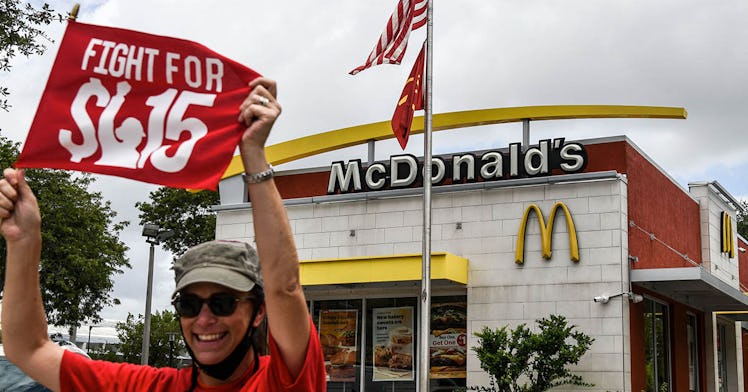McDonald’s Offers Workers Some Middle-Class Benefits. Finally.
Fast-food employees are fed up with being forced to work in terrible conditions for terrible pay.

In order to win back workers and combat service industry burnout, McDonald’s is offering employees a ton of new perks, including increased wages, child care assistance, paid time off, and help with tuition costs.
The global fast-food chain is planning to begin paying entry-level workers between $11-17 per hour, while shift managers can earn between $15-20 per hour. And employees will soon have access to emergency backup child care, along with other perks that have typically been reserved for “middle class” workers.
This could represent a long-overdue first step in an industry-wide shift when it comes to employees in the service industry, especially fast food. Historically, workers at places like McDonald’s, Burger King, and pretty much every other fast food joint have typically been paid minimum wage and have been given little to no benefits, as people consider the job “unskilled labor” that high schoolers fill.
But in reality, the average age of a food service worker is 32-years-old, meaning that the jobs most widely populated by grown adults who need to make money to survive, to pay rent, bills, and buy diapers, and more. That’s why Chipotle, for example, offered workers a path to the middle class with a path towards six-figure wages. Retail service workers who worked at Under Armour had their own pay boosted by at least half, which is great news.
The pay boosts and benefits increases are a sign that employers are understanding that people need better pay, and working conditions, in their jobs, so they can support themselves and their families.
Frustration among workers had been building but it seemed to come to a head with the pandemic, as they were expected to continue working in dangerous conditions for the same low pay and lack of perks.
As a result, even as jobs have started to return due to the vaccine, many chains and restaurants have struggled to fill the positions. And those workers who have returned are much less willing to endure terrible working conditions for terrible pay, as evidenced by a viral post of a Burger King sign in Nebraska that read: “We all quit. Sorry for the inconvenience.”
Some companies have responded correctly — by raising their wages to meet the new value of labor, which had been depressed for quite some time.
Unfortunately, we are likely still a long way away from a livable wage becoming the norm for fast-food workers but the fact that McDonald’s is willing to at least give some of these benefits to employees is a good sign of progress being made.